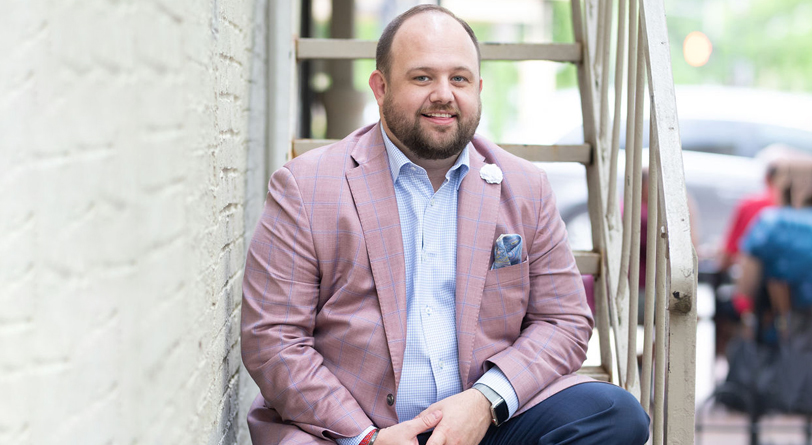In each issue, FlexPack VOICE® hosts a question-and-answer segment with an industry leader. In this issue, we talk to Jonathan C. Quinn, vice president of marketing and sustainability for Accredo Packaging Inc./API Group Holding Inc. and co-chair of the Emerging Leadership Council (ELC) of the Flexible Packaging Association (FPA).
Quinn points out that he has always had a strong connection to the flexible packaging industry, with his father having been in the industry.
“I was in the lab helping with testing film before I could tie my shoes,” Quinn says. “The most important thing my father instilled in me was how special this industry is and that is due, ultimately, to the people.”
His dream growing up was to go to Clemson University in South Carolina and study packaging and then work on the commercial side of the flexible packaging industry.
“Every day I get to live out the dream I put down on paper in seventh grade,” he says. “Before graduating from Clemson, I did multiple internships. First, I interned with Pregis in Manchester, England, then went on to intern for Scholle Packaging in Breda, Holland, and my last experience was with Pliant Corporation.”
Before joining Accredo Packaging Inc. and the API Group, he worked as director of market development and sustainability for Pregis.
Along the way, he has held leadership and advisory roles in various industry boards and organizations. “I am most proud of my role within the Flexible Packaging Association,” Quinn says. “The privilege of serving as the ELC co-chair and the chairperson’s advisory council has truly meant the world to me.”
FLEXPACK VOICE®: What do you see as the major challenges facing the industry, globally and/or domestically?
JONATHAN C. QUINN: The flexible packaging industry faced numerous challenges in 2023 and will continue to do so into 2024 as we address sustainability both globally and domestically. Consumers are increasingly demanding sustainable packaging solutions, and at the same time, we know maintaining product performance and safety is crucial.
Varying regulations and supply chain disruptions are causing issues on a global scale, and there is a push for more localized production due to environmental and economic concerns. Policy-related challenges will remain at the top of the list of challenges. Educating consumers on proper recycling and disposal is fundamental, and the impact of different materials remains a significant challenge that we as an industry need to tackle head-on.
Despite these challenges, there are opportunities to innovate and lead in 2024 through collaboration, education, and partnership.
FPV: Sustainability often comes up when answering that question. What is the industry doing well?
JCQ: Sustainability is a major focus within the flexible packaging industry, with significant progress being made in material innovation. The development of recyclable materials and innovation is critical to enable the next phase of a circular economy: recycled content. To have recycled content, we must have a strong infeed of material, which is why it is so important that we have recyclable materials.
Recycling infrastructure needs to be more consistent, and consumer education is necessary to ensure proper disposal or recycling of packaging for maximum sustainability. As an industry, we have done a tremendous job talking to ourselves for years, if not decades. We need to start talking to consumers and educating them on material selection and why flexible packaging is vital to a sustainable future.
FPV: What about at your company?
JCQ: Regarding Accredo Packaging and the API Group as a whole, I have the tremendous privilege to lead the marketing and sustainability organization across all business units globally. It is a true pioneer in the sustainable packaging and circular economy conversation. We brought the first fully recyclable all polyethylene pouch to the market in 2014. It does not stop there as sustainability is literally foundational to who we are with the fact that we were the first LEED (Leadership in Energy and Environmental Design) Silver Certified flexible packaging company in North America. Additionally, our Sugar Land, Texas, campus is 100% wind powered, and our Vietnam location is solar powered. These are not small feats. And they position us to help enable the sustainability goals of our customers. We will continue to push to achieve what years ago may have seemed impossible through our focus on product and operational sustainability.
FPV: Issues with supply chains and raw materials are sometimes brought up, too, especially shortages for aluminum. Thoughts on those concerns?
JCQ: Supply chain challenges and raw material concerns are significant for the flexible packaging industry, especially in the current climate. Recent disruptions, including [COVID-19] pandemic-related issues, geopolitical tensions, and transportation bottlenecks, are multifaceted.
Any shift requires careful consideration of environmental and functional implications. These disruptions highlight the importance of diversifying sourcing strategies, investing in domestic or nearshore production capabilities, and enhancing recycling capacities to reduce reliance on raw aluminum extraction. Agility, contingency planning, and proactive approaches are crucial for meeting customer demands and navigating global supply chain complexities.
FPV: How do you see government regulations as they pertain to the industry?
JCQ: Government regulations are crucial for the packaging industry’s direction. They can promote innovation, sustainability, and consumer safety. Regulations, especially those focused on enabling and encouraging sustainability, push the industry toward greener solutions in line with global efforts to minimize environmental impact. However, the key to government regulation is to make sure that it is being done based on scientific and factual reasoning—not emotion. Policy based on emotion will have unintended financial and environmental consequences. The pathway to this is through working with legislators and educating them on scientific-based decision-making on material and format selection.
Extended producer responsibility legislation supports and drives efforts to improve recycling infrastructure, modernizing, and expanding facilities to further invest in research that can optimize the industry. Education on recycling and domestic supply chains for recycled materials is needed to fortify sustainability further. A synergistic approach with regulations and investments can amplify the industry’s journey toward a circular economy.
